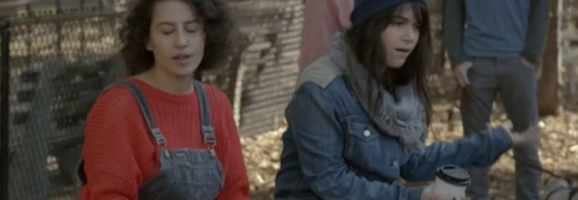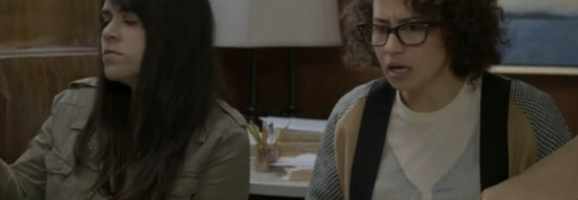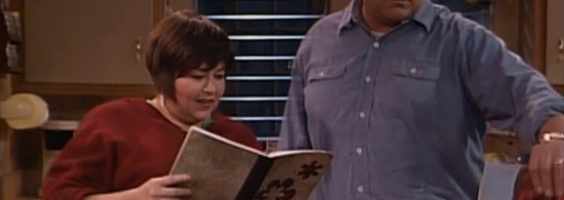Broad City: Reclaiming the American Dream
Broad City, which premiered on Comedy Central on January 22, follows two twenty-something girls (Ilana Glazer and Abbi Jacobson) on their misadventures through New York City. While the show’s trailers depict the girls’ lives as nothing more than humorous and trendy hipsterism and edginess, Abbi and Ilana’s trials are far from shallow. In Ilana’s own words, the show is about “two Jewess’ just trying to make a buck,” and their financial troubles seem to be the central theme of the show from the episodes aired thus far. And the girls aren’t just slackers, either, as both hold jobs. Abbi, the more cautious and level headed of the duo, works at a local gym, stuck as a maintenance worker who dreams of being a trainer. Ilana, the brash one, is employed at a vague internet company with a vaguer goal who does not have the means to even pay its employees.

The first episode revolves around the girls trying to pull enough money together to go see a Li’l Wayne pop-up concert (200 dollars) and the ensuing antics that range from the humorous, depressing, and eventually, disturbing. After realizing her employer cannot pay her salary, Ilana seeks help from Craigslist, where a number of perverts contact her. The two girls eventually wind up in Fred Armisen’s creepy apartment, who stiffs them after they clean his apartment. Broke and discouraged, they retreat into alcohol and bond over the experience. One of the most charming aspects of the show is how the girls rely on each other’s friendship during hard times.
There has been a trend in recent American television to shy away from depicting lower middle class families. From children’s television, to sitcoms, to HBO, we have seen a surge of wealthy upper and middle class families on television and a general lack of characters with economic issues, which is strange considering the dwindling job market and Great Recession. Compare the humbly average Wrigley’s on The Adventures of Pete & Pete to the plethora of contemporary surreal and glitzy Disney and Nickelodeon Hannah Montana-looking programs, where beautiful teenagers seem to have endless Scrooge McDuck piles of gold. Or look at recent episodes of the animated sitcom The Simpsons versus old episodes of The Simpsons. While in the third season, airing in 1992, the Simpsons family struggles to pay for their dog’s, Santa’s Little Helper, surgery to save his life in the heartfelt “Dog of Death.” Whereas in the The Simpsons now, in its twenty-fifth season, has a plot revolving around Homer spying on Marge with high-tech glasses. Again, what was once a realistic portrayal of the American middle class devolves into a semi-surreal cartoon without morality and responsibility of the artist.
Modern Family, a recent comedy series which has met universal critical acclaim, seeks to break new grounds by tackling controversial issues such as gay marriage, gay adoption, racism, and agism. The show features a large, varied cast, including a dysfunctional “nuclear” family, a married gay couple with an adopted daughter, and an older gentleman who has recently married a young Colombian woman, and every week, chaos and hijinks ensue. The cast is superb, with most episodes tightly written, but for depicting the average, modern family, the Dunphys, the Pritchett-Delgados, and the Tucker-Pritchetts appear to be incredibly wealthy, each family boasting a luxuriously large and well-furnished LA home.

This is not to say that the show has somehow lost its way in its depiction of the American family (it’s actually pretty good at this), but long gone are the days of the rough and real sets of a show like Roseanne, which aired from 1988 to 1997. Roseanne, a sitcom centered around comedian Roseanne Barr, the matriarchal figure of the Connor family, follows an American working-class family struggling to get by in a fictional Illinois suburb. The show is notable for its portrayal of a “blue-collar” family with both parents working outside the home and tackling several controversial issues, one of the big ones being poverty. Roseanne’s children struggle with the notion of not being able to afford going to college, father Dan can barely keep a job for the first few seasons, and one of the most striking moments in the show’s history is the last episode of the first season, “Let’s Call It Quits,” where Roseanne walks out of the factory she works at due to the new supervisor’s unrealistic quotas. The second season revolves around Roseanne searching for a new stable income, including fast food worker and phone solicitor.
In many ways, Roseanne depicts the American family as it truly is in a way that Modern Family does not. For several of the early seasons, Roseanne must settle instead of following her dream of becoming a writer. During the final season, the Connor’s win the lottery and become millionaires, yet this only upsets the balance of their family, dispelling the notion of the “American Dream,” the national ethos of upward social mobility.
One of the key components to the Connor’s economic situation is the status of their home and one of the events that significantly affects this is when Dan takes a second mortgage on their house to pay for a motorcycle shop he wants to start (which eventually he must give up). Home ownership has always been a status symbol in American culture, and it often distinguishes the middle classes from the poor. The Connor house is a symbol of the strength and togetherness of Roseanne’s family, and the constant economic dangers it faces mirror the family’s own poverty.

Moving back to Broad City, the focus of the article, when one reflects on Ilana and Abbi’s economic situation, it would be impossible to imagine either one owning a house. They can barely afford a pair of concert tickets. There is no room in either one of their jobs for promotion, thus they are stuck, forever two broke girls (notable is the sitcom 2 Broke Girls, which has a similar premise, but lack of character depth and lack of reality altogether forces the show into unaffecting, inane sitcom territory). Ilana and Abbi will continue to live in their small apartments into the unforeseeable future.
On one episode of Broad City, Abbi, looking to better herself, challenges herself to buy her own marijuana for once (which seems goofy, but stay with it). She calls some old classmates (indicating that she did in fact go to college) and speaks to a woman on the phone known as “Cheese.” The audience sees Cheese on the other line, well-dressed, in a very well-furnished kitchen, holding a child while another screams in the background. Cheese judges Abbi on the fact that she still smokes marijuana, which prompts Abbi to claim it was a prank call and hangs up. Cheese, who obviously was a party lover in college, has now grown up.
Her stretched ears with the plugs taken out are a symbol of her teenage rebellion and clash with her surroundings, seeming to make a statement about growing up and the harebrained futility of teenage rebellion, but then we see her take prescription medicine and drink a cocktail before the camera cuts. She is no different than Abbi trying to score pot, except she does not even realize how unstable her life is. She has a large, nice home, and presumably a wealthy husband (Cheese is home watching the kids during the day), seemingly living that American Dream. And yet, just like Gatsby, just like the characters of Edward Albee, Cheese is a satire of the dream, naive and blinded.
An obvious comparison can be made between Broad City and the HBO series Girls, which also features young women trying to make it in New York City. Girls is set up to be a realistic comedy-drama that pans out sort of like a soap opera, but its tone sticks to the real world as much as possible. Lena Dunhamn’s, the show’s creator, character, Hannah, is an aspiring writer living in Brooklyn whose parents recently cut her off financially. Marnie, who met Hannah at Oberlin, is an art gallery assistant until season two, and is well put together to an archetypal T. There’s also the bohemian Jessa, who is somehow a “world traveller.” These girls’ lives are filled with hardships, some, as mentioned, relating to their career and economic welfare. Yet, each girl comes from a clearly upper class background, and despite their problems, each girl makes it seem incredibly simple to move to the City and make a living without doing much and survive easily.
In comparison, by the end of episode one of Broad City, the girls are drinking liquor in a gutter with a homeless person. For all its bombastic, Comedy Central sitcom qualities, Broad City is very clear (without being on the nose) about where it and its characters stand.
In the post-post modern age of cynicism and the internet, post-The Cosby Show, most people know to scoff at any notion of the so-called American Dream. It’s something of a joke, something to diffuse in high school lit class. But the question should be raised: if the American Dream is not about social mobility and owning a home, than what is it that drives Americans, if anything at all?
For Ilana and Abbi, who obviously want money but can’t seem to get it, well, they just want to hang out, smoke weed, watch Netflix, and be content without getting screwed over by the system. And while they may not be seeming to aim very high, there’s something about Ilana and Abbi that is reminiscent of Roseanne and Jackie from Roseanne, where characters stick with each other and friendship and family is essential through getting tough financial times. Broad City is not a manufactured program, but one from the perspectives of two very real people, and, weed jokes aside, is a very serious and telling portrayal of the young American.
What do you think? Leave a comment.











I honestly didn’t know anything about this show until it followed workaholics a few weeks ago. I decided to give it a chance and was pleasantly surprised watching every ep since. Shockingly witty and gritty I can’t see this show lasting forever, but it’s definitely worth a watch.
This show is just a one note idea saying, “Hey, we’re wacky and crazy and we like pot”. It just feels old. Something like this should have been done in the late 90’s and with a better cast. It’s just, stale.
One of the episodes is about how one of the girls can’t handle pot. I thought the same thing you did when I saw the first trailer, but it really is quite a nice show with some depth. I’d give it a chance.
Curious as to why you bring up the “late ’90s”…
This isn’t even close to the worst show on Comedy Central. I think it has potential. Way better than sh!t like the Kroll Show
I agree that weed-loving and campiness of the show is a little old, but I feel that it’s different with Broad City because the show revolves around two young subversive women. It’s not so much “look, women -can- be silly and be potheads too,” but rather that we are. Of course, the question remains, what are the implications of girls merely mirroring boy-tropes (although, arguably it’s doing more than that)?
Also, while undoubtedly a feminist show, the writing tackles conceptions of femininity in a way that’s not overbearingly moralizing, which is what I believe sets it apart from other post-college/girls/urban shows.
I’ll give this one a chance. My concern with any girl-comedy stuff is that it seems like there is a lot of Danica Patrickesque stuff where they will give a girl a show because they want to give a show to a girl, instead of giving it to whoever (girl or boy) based on merit.
There was this show called (I think) “Best Friends Forever” on one of the networks and it was so obvious they just gave the two girls a show because they wanted to have a show by two girls. It took them about three weeks to learn their lesson (at least I hoped they learned).
If they wanted to give a show to two girls who have earned it, they should give one to those girls who go by the name ‘Garfunkel and Oates’. Those chicks are great.
My other concern is that they will fall into the Amy Schumer thing were they rely almost entirely on sex topics (or “gross” stuff) just for the “Women aren’t supposed to say that stuff!” shock value. It’s fine for women to talk about that stuff but when that is all it is, it gets old really quick. It’s like a black comedian who only does black guy/white guy stuff.
I was able to watch the first episode and be hopeful for the series. But week after week of these slackers screwing up gets tiresome. I don’t think I can take any more after this week.
I love this show precisely because it is showing women who I would be friends with and who resemble a sillier version of myself.
I like the comedy of this show, and the cast is perfect for the job. Without that cast, i find the interactions to be dull. In fact, me and a scene partner are doing a scene from an early episode. The dialogue is funny on paper, but has a harder time being brought to life. I know we are not master comedians, but the humor is a funnelled one and because of that, i don’t see it lasting very long. in fact, i think that it will get greater success when it has been off air for awhile much like shows like LOST, Friends, and almost every other show pictured on Netflix.
Love the parallels drawn here with Roseanne, another of my favourite shows, as Broad City has become. Roseanne was so smart, and her show was so real and funny and sometimes tragic. The characters often lose whatever it is they want, and I’d argue that’s the revision of the American Dream: Americans are supposed to be people that get knocked for a dozen loops, get back up and keep trying again. I don’t understand the ubiquitous elaborate set, I suppose it’s an element of the escapism of TV. But Roseanne’s house was always one of my favourite parts of the show. And I think it takes more work to make a ‘normal’ house look good, rather than have the home simply look stylish like the houses of Modern Family or the apartment in 2 Broke Girls (latest guilty pleasure to project an unrealistic image of ‘poverty’…ick, I have more money than those characters are supposed to, and I have leaks in my ceiling and roaches). I loved how tacky all their stuff and their outfits always were, that was more relatable to me. One of my favourite episodes had the Connors decking their home in the tackiest possibly Christmas decorations purposefully to offend their neighbours. And that seems an even bigger part of the American dream, the part that won’t let Americans quit: doing whatever you want, and pushing even harder if anyone dares try to stop you.
Wow, if I could give an award for best comment, you’d win. Very perceptive. I hadn’t thought about that particular episode of Roseanne like that, but yeah, you’re absolutely right.
Man, a lot of people don’t like the show, I’d expected more positive comments. Has anyone here watched the web series? I found it really propped up the TV series and expect the full-length will gain momentum to catch up, here’s hoping it’s not solely effective in a micro format.
I’m glad I read this, but if anything, it just seems like a chick version of Workaholics, and recently just watched an episode of Broad City, wasn’t that amused.
Great article! Never seen Broad City but now I feel inclined to start! As for realistic depictions of the American Dream, I wonder if you’ve ever seen the U.S. version of Shameless. That, I believe, is a very accurate portrayal of many poor working class families in America.
Great job! Another episode of Broad City as it relates to the American Dream I thought of is the season finale. “The Last Supper” really draws out the contrast between Abbi and Ilana and the wealthy New Yorkers they are surrounded by. In particular, I would cite the discussions that guest stars Amy Poehler and Seth Morris have behind the scenes in the kitchen. Even though they cultivate a sense of class for the sake of the restaurant and it’s patrons, their deteriorating relationship in the kitchen stews beneath the surface of a stereotypical picture of success.